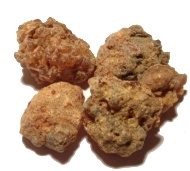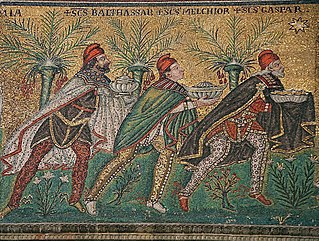Related Research Articles

Myrrh is a gum-resin extracted from a number of small, thorny tree species of the genus Commiphora. Myrrh resin has been used throughout history as a perfume, incense and medicine. Myrrh mixed with posca or wine was common across ancient cultures, for general pleasure, and as an analgesic.

The biblical Magi, also referred to as the (Three) Wise Men or (Three) Kings, also the Three Magi were distinguished foreigners in the Gospel of Matthew and Christian tradition. They are said to have visited Jesus after his birth, bearing gifts of gold, frankincense and myrrh. They are regular figures in traditional accounts of the nativity celebrations of Christmas and are an important part of Christian tradition.

Frankincense is an aromatic resin used in incense and perfumes, obtained from trees of the genus Boswellia in the family Burseraceae. The word is from Old French franc encens.

Magan was an ancient region which was referred to in Sumerian cuneiform texts of around 2300 BC and existed to 550 BC as a source of copper and diorite for Mesopotamia. There is also evidence to support the idea that the Magan people were actually Sumerian. As discussed by The Archeology Fund founded by Juris Zarins, "The Sumerian cities of southern Mesopotamia were closely linked to the Gulf. Archaeologists and historians have linked sites in Saudi Arabia, Bahrain, and Qatar to the Sumerian geographical term of Dilmun. Oman, was most likely the Sumerian Magan".

"We Three Kings", original title "Three Kings of Orient", also known as "We Three Kings of Orient Are" or "The Quest of the Magi", is a Christmas carol that was written by John Henry Hopkins Jr. in 1857. At the time of composing the carol, Hopkins served as the rector of Christ Episcopal Church in Williamsport, Pennsylvania, and he wrote the carol for a Christmas pageant in New York City. It was the first widely popular Christmas carol written in America.

Boswellia is a genus of trees in the order Sapindales, known for its fragrant resin. The biblical incense frankincense is an extract from the resin of the tree Boswellia sacra, and is now produced also from B. frereana.

Matthew 2:11 is the eleventh verse of the second chapter of the Gospel of Matthew in the New Testament. The magi, dispatched by King Herod, have found the infant Jesus and in this verse present him with gifts in an event known as the Visit of the Wise Men. In art, it is traditionally referred to as the Adoration of the Magi.

The Burseraceae are a moderate-sized family of 17-19 genera and about 540 species of flowering plants. The actual numbers differ according to the time period in which a given source is written describing this family. The Burseraceae are also known as the torchwood family, the frankincense and myrrh family, or simply the incense tree family. The family includes both trees and shrubs, and is native to tropical regions of Africa, Asia. Australasia, and the Americas.

The Incense Trade Route was an ancient network of major land and sea trading routes linking the Mediterranean world with eastern and southern sources of incense, spices and other luxury goods, stretching from Mediterranean ports across the Levant and Egypt through Northeastern Africa and Arabia to India and beyond. These routes collectively served as channels for the trading of goods such as Arabian frankincense and myrrh; Indian spices, precious stones, pearls, ebony, silk and fine textiles; and from the Horn of Africa, rare woods, feathers, animal skins, Somali frankincense, gold, and slaves. The incense land trade from South Arabia to the Mediterranean flourished between roughly the 7th century BC and the 2nd century AD.

Stacte and nataph are names used for one component of the Solomon's Temple incense, the Ketoret, specified in the Book of Exodus. Variously translated to the Greek term or to an unspecified "gum resin" or similar, it was to be mixed in equal parts with onycha, galbanum and mixed with pure frankincense and they were to "beat some of it very small" for burning on the altar of the tabernacle.
Ross Rentea MD has been a practicing family physician in Chicago for over 25 years. He is an author, editor, physician of anthroposophical medicine and innovator.
Ante Babaja was a notable Croatian film director and screenwriter.

Martin Sinković is a Croatian rower. He is the younger brother of rower Valent Sinković, with whom he won the gold medal in Men's double sculls at the 2016 Summer Olympics in Rio. He had previously won the silver in the men's quadruple sculls at the 2012 Summer Olympics with his brother, David Šain and Damir Martin.

Valent Sinković is a Croatian rower. He is the older brother of rower Martin Sinković with whom he won the gold medal in Men's double sculls at the 2016 Summer Olympics in Rio. He had previously won the silver in the men's quadruple sculls at the 2012 Summer Olympics with his brother, David Šain and Damir Martin.
Ante Slobodan Novak was a Croatian writer and novelist. He is best known for his novel Gold, Frankincense and Myrrh (1968), often listed as one of the best Croatian novels of the 20th century.

Giovanni Cernogoraz is a Croatian sports shooter. Competing in shotgun events, he won the Olympic gold medal in men's trap at the London 2012 Summer Olympics. He was elected for Croatian Sportsman of the year by Sportske novosti in 2012.

Saint Caspar was one of the 'Three Kings', along with Melchior and Balthazar, representing the wise men or 'Biblical Magi' mentioned in the Bible in the Gospel of Matthew, verses 2:1-9. Although the Bible does not specify who or what the Magi were, since the seventh century, the Magi have been identified in Western Christianity as Caspar, Melchior and Balthasar. Caspar and the other two are considered saints by the Catholic Church.
The Return of Philip Latinowicz is a novel by the Croatian author Miroslav Krleža. It is considered the first modern complete novel of Croatian literature. The structure is very complex, although it has no classical composition and storyline.

Saint Melchior, or Melichior, was purportedly one of the Biblical Magi along with Caspar and Balthazar who visited the infant Jesus after he was born. Melchior was often referred to as the oldest member of the Magi. He was traditionally called the King of Persia and brought the gift of gold to Jesus. In the Western Christian church, he is regarded as a saint.
Myrrh is a natural gum or resin extracted from a number of small, thorny tree species of the genus Commiphora.
References
- ↑ "Mirisi, zlato i tamjan". Filmski leksikon (in Croatian). Miroslav Krleža Institute of Lexicography. 2008. Retrieved 12 March 2017.